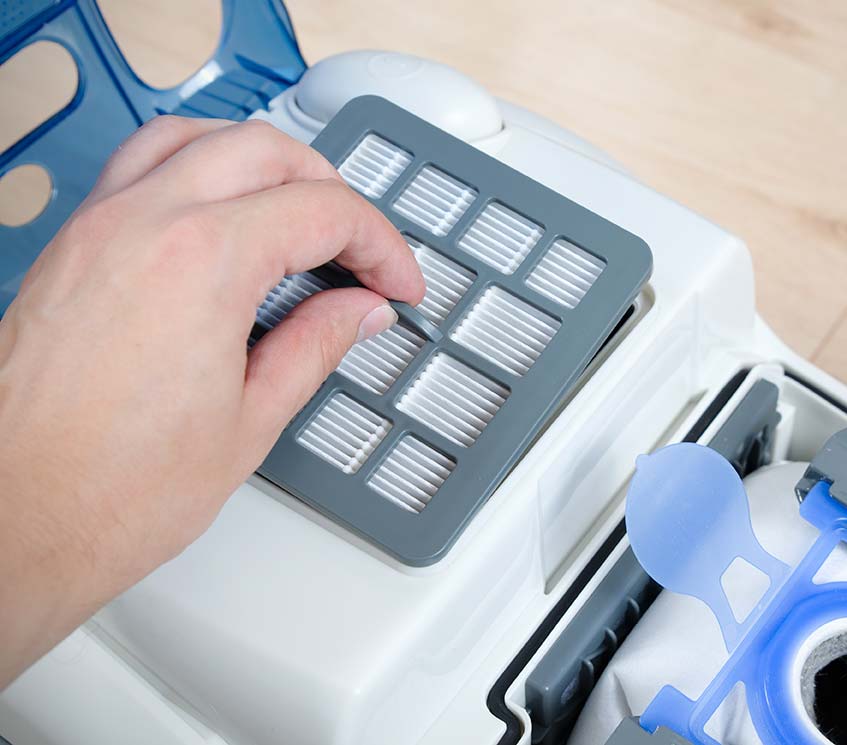But how often should you vacuum every day? And are you rushing through a vacuuming session, or are you taking your time to get best results?
Vacuuming, of course, is the best way to remove the surface dirt and all kinds of contaminants from your carpets and area rugs between professional hot-water extraction deep cleanings, and before the dirt works its way down deep into the carpet fibers and gets stuck there until your next professional cleaning.
For the average home, I recommend vacuuming at least once per week — but ideally 2-3 times a week — and if you have pets, 3 times a week is the bare minimum. Your high-traffic areas, and your pet's favorite napping spots, will definitely benefit from daily vacuuming.
- People actually "shed" over 9 pounds of skin cells every year.
- Crumbs and spills from food dropped onto a carpet surface will eventually be ground deep into a carpet and stay there until you have a professional deep cleaning.
- Pollen, dust mite waste, and mold spores accumulate in your carpets too.
- Pet hair, dander (skin cells), and dirt that pets track in from the yard and litter box end up on the surface of your carpet, and eventually get ground in deep into your carpet.
For best vacuuming results
please slow down!
Most people when they vacuum just want to get it over with, naturally. That's understandable. So, we end up vacuuming too quickly — and only in one direction.
The correct way to vacuum is slowly, making multiple passes in multiple directions. If you only vacuum in one direction, you're only removing a fraction of the dirt, dust, pollen, and other contaminants.
Maintain your Vacuum cleaner properly
After each use, just take a few moments to make sure the belts, beater-bar, vacuum bag, and HEPA filter are free from debris and in good working condition. It's easy to look past these simple measures, but in order for your vacuum to actually work, and at its top efficiency, maintenance is important (but often neglected!). It only takes a minute to inspect your vacuum after each use.
If you use vacuum cleaner that uses a disposable bag, please change your bag when it's half full. The vacuum will begin to lose its efficiency if the bag is more than half full. And please do not empty and then reuse your disposable vacuum bags.
Even regular carpet vacuuming does not count as "carpet cleaning".
No matter how often and how well you vacuum, some amount of soil will work its way down into the carpet fibers. In addition, running a vacuum cleaner over your carpet is ineffective at removing the oily residues that accumulate in your carpet from molecules of cooking oils, oil-based air fresheners, fireplace and candle soot, cigarette smoke, suntan sprays, and a host of other sources that become airborne and settle on your carpets.
In order to get the oily residues and deep down dirt, and even fiber-damaging sand-like particles, I highly recommend professional Hot Water Extraction cleaning every 12 - 18 months for the average home. Most carpet manufactures require this method and frequency of carpet cleaning in order to keep their warranties intact. It's as important for the longevity and lifespan of your carpet as it is for your health and your carpet's appearance.
Article: How often should you have your carpets professionally cleaned?
Please read this article for best advice on how often to have your carpets professionally cleaned.
Are you looking for a new carpet cleaner?
If you're in the market to purchase a new carpet cleaner, I recommend purchasing one with 2 motors — that way, the brushes and the suction each have their own motor to really help dig out deeply-embedded loose soils.

I also recommend purchasing a vacuum cleaner that contains a HEPA filter, especially if you or anyone in your household has problems with allergies.
These vacuums are great for trapping even tiny molecules of dirt and allergens in the air, and they are also great for allowing less pollutants back into breathing air while vacuuming.
Using anti-allergy vacuums with a HEPA filter can trap up to 99.9 percent of airborne particles, greatly protecting your indoor air quality as you vacuum. Regular vacuums just blow these particles back into the air, which then settles back onto your carpets only to become airborne again from daily walking.
Conclusion
If you have any questions about this article, or anything related to cleaning carpet, upholstery, tile and grout, and maintaining a healthy home, please feel free to give me a call, and I'll be happy to help.
To your clean and healthy home!


